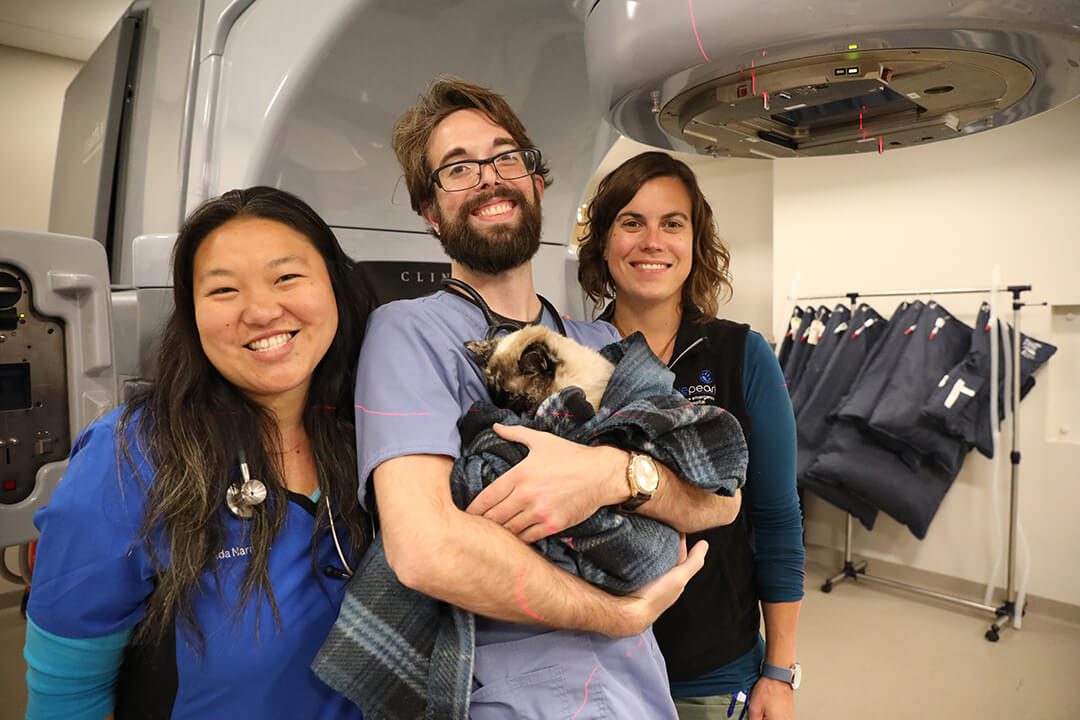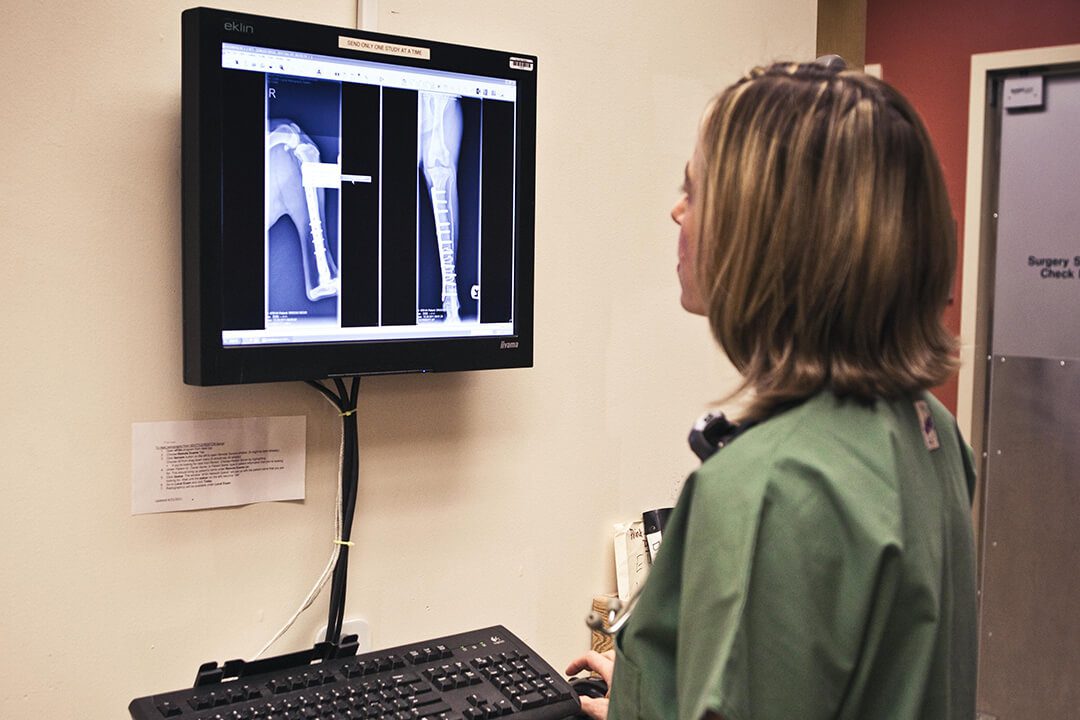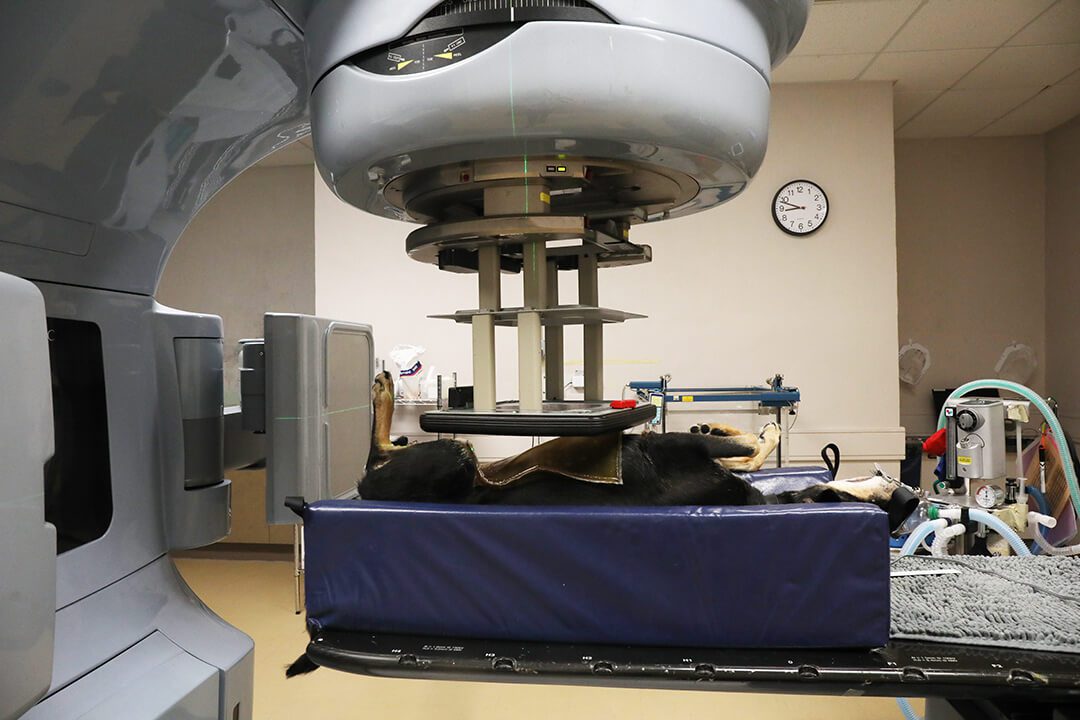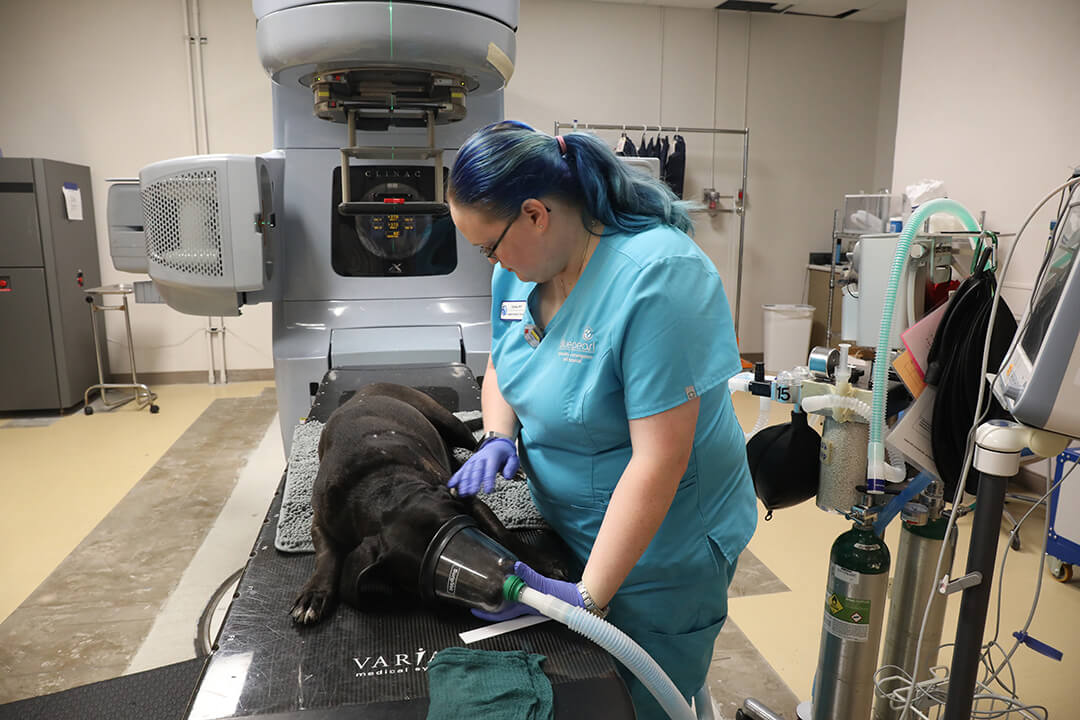What is radiation therapy?
Your dog loves nothing more than a good belly rub and you’re happy to oblige. But, one night, as you’re scratching his tummy, you feel something different. There’s a strange lump underneath his fur and skin. What is it?
It’s possible that a lump on your pet is just a benign mass that can be easily removed. But it’s also possible that it could be malignant, which means cancer is present.
The first step is to take your pet to see your family veterinarian. Your vet will most likely recommend having the lump removed and biopsied.

What if it’s cancer?
If the biopsy comes back positive for cancer, your vet may refer you to a cancer specialist called a veterinary oncologist. The oncologist will examine your pet and create a treatment plan based on the type, location and severity of the cancer. Believe it or not, today’s cancer treatment for pets uses similar methods to human medicine. Your pet’s plan could include surgery and/or chemotherapy.
A third option for your pet’s treatment is radiation. Radiation oncology is a veterinary specialty that entails the use of controlled radiation to treat cancer. This is called radiation therapy and it’s another option that could be included in your pet’s treatment plan on its own or in combination with surgery or chemotherapy. Watch our video to see what the process of radiation therapy looks like for both cats and dogs.
What Is radiation therapy?
Radiation therapy is a form of cancer treatment that is most helpful for tumors with a low rate of metastasis (spread to other organs) that are confined to one area of the body.
Oncologists recommend radiation therapy for your pet when surgery is not an option or would result in unacceptable side effects. It can also be used in conjunction with surgery if the entire tumor cannot be removed.
Dr. Nathan Lee is a board-certified veterinary radiation oncologist at BluePearl Pet Hospitals. He is one of fewer than 100 board-certified specialists practicing veterinary radiation therapy in the world. “Radiation therapy has increasingly become a standard of care in veterinary oncology. Our machines have become much more sophisticated to allow us to do pretty much anything a human radiation oncology program can do,” he says.

How is radiation therapy delivered?
The actual procedure is similar to shining a beam of light on the affected area. Only the tissues that fall within that beam receive the treatment.
In most cases, radiation therapy cannot be given in one large dose without causing complications to normal tissues. So this therapy is administered to your pet in small doses over multiple daily treatments. This provides the best chance of tumor control while minimizing damage to the normal tissues.
At BluePearl, we take pride in staying at the forefront of veterinary medical advancements. Several of our hospitals use image-guided technology, such as a linear accelerator, to focus radiation treatments with extreme accuracy. That means that doctors can effectively destroy cancer cells with minimal effect on the healthy surrounding tissue.
Because patients must remain perfectly still during each treatment, they are put under anesthesia. Although there is a small risk associated with repeated anesthetic events, each patient is monitored very closely during his or her treatment. In addition, only short-acting anesthetic drugs are used to minimize side effects and to allow patients to wake quickly.
At BluePearl, radiation therapy treatments are done by appointment. Each treatment only takes 15-30 minutes on average. Your pet can typically go home the same day he receives treatment.
For some pets, their cancer can be cured with radiation therapy. In other instances, radiation can be used to reduce the size of the tumor and relieve pain or other symptoms to help make the pet more comfortable.
What are the side effects?
If you are concerned about the side effects of radiation therapy, you can rest easy. “Overall, dogs, cats, and other animals tolerate radiation therapy better than people,” says Dr. Lee.
Side effects occur only in the area that is treated with radiation, which includes the tumor and a small margin of healthy tissue surrounding it. Some minor changes are expected during and right after the full course of treatment, such as hair loss and irritation of the skin or other tissues.
For each patient undergoing full course radiation therapy, we expect to see some degree of these effects. However, they are temporary. We can usually alleviate any discomfort a patient may experience by administering topical or oral medications.
Some changes may not develop until months or possibly even years after completing the full course of treatment. Our protocols are carefully planned to try to avoid any late-occurring side effects.
In situations where recovery isn’t possible, radiation therapy can be used to provide palliative (relief from suffering) care to make the patient more comfortable.
Cancer care for pets has come a long way.
Unfortunately, both cats and dogs are susceptible to cancer. But, a diagnosis of cancer for your pet does not mean there's no hope. Treatments like radiation therapy have advanced greatly in recent years, and BluePearl Pet Hospital's oncology teams have the training and equipment to provide the best standard of care for our cancer patients.
If you feel a lump on your pet or notice any other signs of a serious condition such as significant weight loss, difficulty breathing, or sores that do not heal, act quickly. If your pet’s regular veterinarian is not available, find a BluePearl Vet Hospital. We have over 75 locations nationwide and many are open 24 hours a day, seven days a week.
The sooner you can get a diagnosis for your pet, the better your chances of scratching his tummy for years to come.


Find your nearest radiation oncologist.
We have over 100 specialty and emergency pet hospitals throughout the country.
Not all services are available in all BluePearl hospitals. Contact your local BluePearl for services available at that location.
